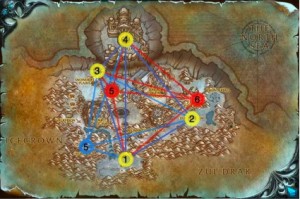This post describes where I would like to go in ETEC 565A and where I would like to be when ETEC 565A is over.
I am a teacher and technology support specialist at a high school in British Columbia. I spend my time supporting students and teachers in their day to day use of technology, making the technology work, advising decision makers on where technology funding is needed the most, advising decision makers on which technology we should be seeking to make use of, using technology and (really!) teaching Information Communication Technology courses. Doing all these in an environment that is cash starved and technical help poor is challenging to say the least. My primary purpose for embarking on the MET journey was to be able to give better advice to the decision makers and to my fellow teachers when they inquire about specific technologies or about specific activities to accomplish with technology.
Currently my main interest is in developing criteria to evaluate educational technology. I am interested in working with Moodle and developing skills and knowledge with that platform. I am also glad to see social media in the course content, as I would like to be able to understand better how social media can be used to enhance student learning. Finally, I want to increase my effectiveness in the area of assessments.
More specifically, I want to be able to justify with theory and literature an evaluation system for the next wave of technology, so the limited technology funding we receive can be spent as effectively as possible. Bates & Poole’s (2003) SECTIONS and Chickering & Gamson’s (1987) Seven Principles are proving to be very useful in formulating some foundations in this, and I see it is, in one form or another, a component of the course.
I want to find out why Moodle is so popular and determine if our current practice of developing courses using Google (Google docs/drive, site, mail and groups) should be moved to a Moodle environment. I need to develop skills not only in Moodle’s use, but also in course management with it. We were using ATutor, which is still a fine LMS, but the sheer weight of material that seems to be available or compatible with Moodle dwarfs ATutor, and we were continually running into problems with file sizes and backing up course material.
I want to find out why we should (or should not) have social media sites available to all students in our school, and I want to find out how social media is being used in other places so I can make recommendations and answer with conviction when I am asked why Facebook is/is not blocked.
Assessment seems a huge area; I am just looking at it and going uhh, I need help, so I am hoping to get help with assessment practices for myself and again, to advise my colleagues. I would like to be able to make recommendations about how and what to assess when students are so connected and so savvy about technology compared to our older teachers.
This is not to say the other areas of the course will not be useful to me; in fact they all look useful and interesting, but there are only so many areas of focus one can have without losing focus completely.
Maurice
¯¯¯¯¯¯¯¯¯¯¯
References
Chickering, A.W. and Gamson, Z.F. (1987). Seven Principles for Good Practice in Undergraduate Education. American Association for Higher Education Bulletin, 39 (7), p. 3-7. Downloaded from http://www.aahea.org/articles/sevenprinciples1987.htm
Chickering, A.W. and Ehrmann, S.C. (1996). Implementing the Seven Principles: Technology as Lever. American Association for Higher Education Bulletin, 49(2), p. 3-6. Downloaded from http://www.aahea.org/articles/sevenprinciples.htm
Bates, A.W. & Poole, G. (2003). Chapter 4: a Framework for Selecting and Using Technology. In Effective Teaching with Technology in Higher Education: Foundations for Success. (pp. 77-105). San Francisco: Jossey Bass Publishers.

